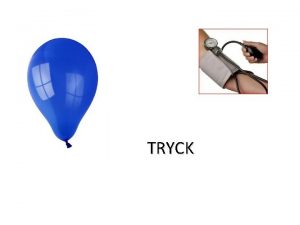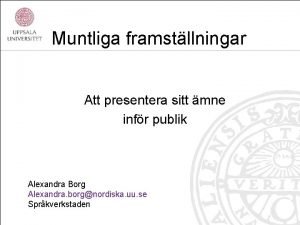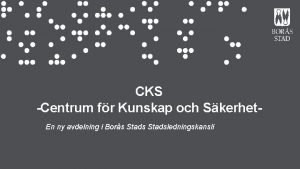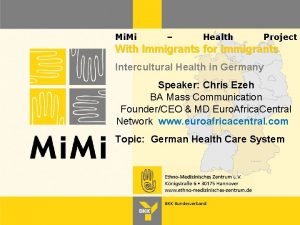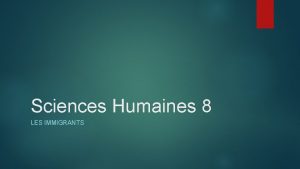Mi Mi Health Project With Immigrants for Immigrants




























- Slides: 28

Mi. Mi – Health Project With Immigrants for Immigrants Intercultural Health in Germany Speaker: Chris Ezeh BA Mass Communication Founder/CEO & MD Euro. Africa. Central Network www. euroafricacentral. com Topic: German Health Care System

The German Health Care System 1. Health Insurance (GKV) 2. Medical Consultation 3. At the Pharmacy 4. Dental Consultation 5. Hospital Stay 6. Public Medical Services (ÖGD) 7. Behaviour in Emergencies

1. Health Insurance (GKV) 1 A) Public health insurance · Contributions: >Employer and insured person >Social coverage in case of illness >Principle of solidarity Who is insured? Þ Compulsory insured Þ Voluntarily insured How do I choose the right kind of health insurance? Premium rates Benefits and extra services Bonus for the insured Domicile of health insurance Ø Cancellation period

1. Health Insurance (GKV) Þ Main benefits Medical care Prescription drugs Home care and help (if certain requirements are complied)) Remedies and adjuvants Hospital stay and medical care Medical care for pregnant women, birth, midwifery, maternity allowance Early diagnosis for adults Early diagnosis for children (U 1 to U 9 and J 1) Immunisations Dental preventiive care, dental prosthesis Psychotherapy Ø Rehabilitation, treatment at a health resort, prevention

1. Health Insurance (GKV) Þ Main benefits (continuation) • All services of the compulsory health insurance (GKV) have to be sufficient, appropriate and economically justifiable • All services that are beyond the absolutely necessity are not covered by the compulsory health insurance (for example: single rooms or extended cost for chief physicians) • Possibility of a private additional insurance

1. Health Insurance (GKV) Þ Additional contributions and co-payments Þ For several services, insured persons have to take their share in the form of a co-payment or additional contributions Þ Examples Medical consultations: practice fee (Praxisgebühr) Pharmaceuticals: co-payment of 10 percent out of the original price, 5, - to 10, - Euro per pharmaceutical (but never more than the exact price) Extra-charge of 2, 50 Euro/pharmaceuticals beyond opening hours. • Hospital care: 10 Euro per day, not exceeding more than 28 days per legal year

1. Health Insurance (GKV) For all co-payments a receipt has to be issued. If one’s copayments go beyond a certain limit, there would be the possibility to be exempted from extra payments or to receive a refund by it’s health insurance. Ø Annual limit: 2 % out of gross income 1 % for the chronically ill Ø There is a special policy for certain groups of people (e. g. welfare recipients)

1. Health Insurance (GKV) 1 B) Private health insurance (PKV) Þ Who is allowed to take private health insurance? • Self-employed persons • Public servants • Employees who have an annual gross income of more than 46. 800 Euro (2005) Main differences in comparison with GKV Benefits are contracted by insured person and health insurance Contributions are based on contracted benefits and the insured’s age, sex and state of health

1. Health Insurance (GKV) 1 C) Legal benefits (following SGB XII) Þ Entitled persons : • Migrants with legal residence permit status which are not falling in the category of asylum seekers and which are not able to insure themselves, neither compulsorily nor privately • Welfare recipients, which are receiving their financial aid for more than one month is health insured by social assistance office. Free choice between different providers! • Otherwise one has to apply directly for a health insurance certificate and reimbursement of costs Þ Requirements: • Financial distress (insufficient income, no health insurance) Medical need • Social assistance office needs certain documents for verification!

1. Health Insurance (GKV) Benefits for asylum seekers by law Þ Restrictions in comparison with GKV : • Entitlement is unrestricted for acute and/or painful illnesses • Restrictions for dental prosthesis • Restrictions for chronical illnesses In order to be able to receive benefits, entitled persons need a health insurance certificate. This is to be given by the appropriate social assistance office or somewhere else where one can apply for benefits ÞExemption out for `Praxisgebühr` and copayments

2) Medical Consultation • Free choice between general practicioners and medical specialists. • Normally, first you have to arrange an appointment with a general practitioner who transfers you to a medical specialist if needed Þ Preparation for medical consultation Which comlaints do I have? Which drugs do I take at the moment? Which questions would I like to ask? Are there any problems with insufficient language skills? Appointment or consultation hour, possibility of getting a home visit by the doctor

2) Medical Consultation What do I have to bring with me to the doctor? • Official health insurance card (Krankenversichertenkarte) • 10 Euro for practice fee (´Praxisgebühr´) If needed: verification of allergies and immunisation, X-rays

2) Medical Consultation Þ A talk to the doctor Medical doctors are bounded by professional discretion! • Which discomforts do I suffer from? • Which kind of treatment is advised by the doctor and what is its mode of action? • Which kinds of pharmaceuticals am I advised to take, at what time and how? • Obey the doctor’s advice! • Ask questions! Openess! Even the not acutely ill are advised to see a doctor regularly! Early diagnosis (cancers and health-check) Immunsisations against infectious diseases

3. At the Pharmacy OTC (over-the-counter) and ethical pharmaceuticals One’s health insurance pays for ethical pharmaceuticals for which a doctor has issued a prescription Compulsory insured persons exchange their prescriptions for their pharmaceutical. They only have to pay the legal co-payment, the rest is covered by public health insurance and is paid directly from them to the pharmacy Privately insured persons balance accounts with their health insurances Opening hours: 9 am– 6 pm Emergency services are available during night time and on weekends (see your local newspaper for addresses of pharmacies on duty). There is an-extra charge of 2, 50 Euro for emergency services.

Dental Consultation • Reguraly visits even in absent of pain At least once a year you should go for preventive checkups! Compulsory health insurances reward their insured if they take proper care for their teeth and go regularly to the dentist (dental prosthesis) ´Bonusheft` (a booklet in which a doctor verifies your visits) is necessary! Þ Public health insurances´ benefits Preventive check-ups • Arrangement for teeth sustainment (inlays, dental fillings) • Pulling teeth out • Allowance for dental prosthesis is fixed (dental crowns, bridges), eventually increasable up to 20 -30% (by verifying regular check-ups)

4. Dental Consultation Þ Treatment Plan and Cost Projection of Dental Prosthesis • Has to be approved by medical insurance before medical treatment takes action • Often, dentists advise services which are not covered by medical insurance (just absolutely necessary services are covered) and those additional services have to be paid by patients themselves È Ask your dentist what is covered by health insurance • Also medical insurances deliberate on a treatment’s usefulness

4. Dental Consultation Þ Co-payments Can be expensive if dental prosthesis is needed Someone with a low income should talk about special arrangements for cases of hardship. One may potentially be released of one’s co-payments Special right of cancellation of private insurances covering dental prosthesis Private Krankenversicherungen Someone who is privately insured is able to close a deal by which all possible dental service may be covered. The insured’s contributions are therefore equally enhanced. It is also possible to cover dental services by a separate deal with a private health insurance within the system of public health insurance (GKV). For example: meeting costs for dental prosthesis

5. Hospital Stay • Confinement: In his prescription, the general practitioner or medical specialist suggests two different hospitals • Confinement form (Einweisungsschein) has to be taken by patient to hospital Ambulant Treatment óTreatment at Hospital

5. Hospital Stay Þ Contract with hospital • If receiving in-patient treatment in hospital, the patient has to sign a written agreement with the hospital • Compulsory medical insurance (GKV) covers costs for their insured’s´ hospital stay and medical costs. Patients` co-payment: 10 Euro per day! • If a patient marked `special requests` (chief physician, single or twin room) with a cross in his contract, he has to pay the extra-costs resulting himself if he has no additional private health insurance • Privately insured’s´ co-payments are fixed within terms of their insurance contract • Applying for everyone: Just sign what you do understand!

5. Hospital Stay Þ Anamnesis and common treatments • Detailed talk to one's general practitioner at the beginning of hospital stay è Clinical picture and history, discomfort • Professional discretion • Frequently: taking a blood sample, X-ray, ECG, ultrasound • Rarely: CT (computed tomography) • Maybe autologous blood donation

5. Hospital Stay Þ Clarification of facts before operations, doctors` responsibilities • Ask questions! Maybe there is lingual support available from family, friends or translators • A patient must sign an informed consent which allows surgeons to operate him • About full or partial narcosis the anaesthetist is to be asked • Medical instructions before and after one’s operation are to be obeyed!!! (For example: Food and drinks)

5. Hospital Stay Þ Everyday life at hospital • Registered and hospital nurses are taking care for board and lodging • Daily ward round > Chance for asking questions concerning treatment and cure. • A patient who has to avoid some food items or do not want to be examined by a group of medical students should bring it up to the staff! Þ Important: Þ What about further treatments? Þ What kind of behaviour is needed in future? Þ Must I take a physical rest or do I rely on a special diet?

6. Public Medical Services (ÖGD) Our medical system's three columns: 1) Ambulant treatment (mostly by general practitioners) 2) Hospital care 3) Public medical service Depending on town or district, public medical service is to be found at local health authority or within other areas of public health system.

6. Public Medical Services (ÖGD) Þ Responsibilities : • Examination before enrolment into primary school, if any developmental disorders are suspected, advice on special needs • Giving advice to disabled persons or to someone who is endangered by disability • Health care for minorities • Home visits by the doctor • Information about health areas (For example: Nutrition, pregnancy, aids)

7. Behaviour in Emergencies Definition: An emergency is any life-threatening illness, injury or situation which calls for immediate medical attention. Examples: Þ High fever? ? ? Þ Breathlessness Þ Fractures Þ Heavy bleeding Þ Toxications Þ Unconciousness Immediate life saving measures Emergency call First aid Ambulance Further emergency medical care

7. Behaviour in Emergencies • In life-threatening situations, injuries to the head, fractures: Call an ambulance Emergency call: 112 • Stick a note with this telephone number beside your telephone ! Keep cool while telephoning: Where is the patient? What happened? What is his current state? (How many persons are injured? ) Waiting for further inquires! • If injuries are not severe it is also possible to take the patient to hospital by car • In case of normal illness: General practitioner and maybe home visits by the doctor • On weekends: Local newspapers inform about which doctors are on duty

7. Behaviour in Emergencies It makes sense to participate in a first-aid course in order to be able to help others in emergencies, before the arriving of doctor or/ and ambulance. That is even more important if you are a parent. First-aid courses are offered by many associations and educational institutions.

Thank you for your attention. Do you have further questions?
 Old immigrants vs new immigrants
Old immigrants vs new immigrants Kontinuitetshantering
Kontinuitetshantering Typiska novell drag
Typiska novell drag Nationell inriktning för artificiell intelligens
Nationell inriktning för artificiell intelligens Returpilarna
Returpilarna Varför kallas perioden 1918-1939 för mellankrigstiden?
Varför kallas perioden 1918-1939 för mellankrigstiden? En lathund för arbete med kontinuitetshantering
En lathund för arbete med kontinuitetshantering Kassaregister ideell förening
Kassaregister ideell förening Tidbok
Tidbok A gastrica
A gastrica Densitet vatten
Densitet vatten Datorkunskap för nybörjare
Datorkunskap för nybörjare Boverket ka
Boverket ka Debattartikel mall
Debattartikel mall Delegerande ledarskap
Delegerande ledarskap Nyckelkompetenser för livslångt lärande
Nyckelkompetenser för livslångt lärande Påbyggnader för flakfordon
Påbyggnader för flakfordon Tryck formel
Tryck formel Svenskt ramverk för digital samverkan
Svenskt ramverk för digital samverkan Lyckans minut erik lindorm analys
Lyckans minut erik lindorm analys Presentera för publik crossboss
Presentera för publik crossboss Jiddisch
Jiddisch Vem räknas som jude
Vem räknas som jude Treserva lathund
Treserva lathund Fimbrietratt
Fimbrietratt Bästa kameran för astrofoto
Bästa kameran för astrofoto Centrum för kunskap och säkerhet
Centrum för kunskap och säkerhet Programskede byggprocessen
Programskede byggprocessen Mat för unga idrottare
Mat för unga idrottare

















